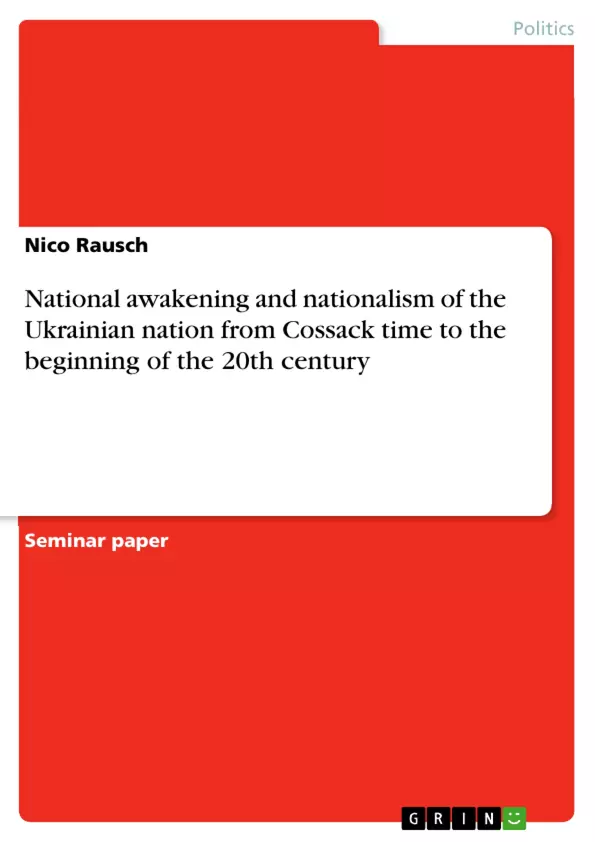To describe the Ukrainian nationalism I will also use the famous concept from the Czech historian Hroch who is dividing the national movements into three phases. Phase 1) cultural awakening- a small group of educated people develops an interest in language, history and folklore of an ethnic group.
Phase 2) national agitation- the implementation of national consciousness into a wider circle of the population in order to mobilize them and to integrate them into a national community which will lead to Phase 3) mass movement with its goal of political autonomy (Hroch in Kappeler 2001/ Weeks 1996). The case of Ukraine is in this sense not very easy to look at because of several events, in form of national policies of two influential Empires. Another interesting theoretical point of view is the distinction between ‘ancient’ and ‘young’ nations and their prospects to form a successful national movement. The former having a tradition of a national elite, and high culture, and the latter not. Young nations also have an incomplete social structure and almost no urban middle class. They also are fighting first primarily against the foreign elite and less against the state. The main aim is to create firstly a high culture of their own. Ukraine is seen as such a ‘small’ or ‘young’ nation (Kappeler 2001).
I will describe Ukrainian nationalism in the context of modernization and mobilization through social, economic and political changes as well as on special events that might had a greater impact on the Ukrainian nationalism. The time period covered in this paper will be from the starting point of pre-historical Ukrainian ‘nation’ to the reenactment of the above described third phase of national mass movement.
Inhaltsverzeichnis (Table of Contents)
- Introduction
- The Cossacks Hetmanate as the starting of Ukrainian nationalism
- The national awakening of Ukrainians in the Austrian and the Russian Empire
- Austrias reforms in educational and religious issues and its impact on Ukrainian nationalism
- Cultural awakening of Ukrainians in the Russian Empire
- National agitation and organizational stage and mass movement
- In the Austro-Hungarian Empire
- In the Russian Empire
- Conclusion
Zielsetzung und Themenschwerpunkte (Objectives and Key Themes)
This paper aims to examine the development of Ukrainian nationalism from its origins in the Cossack Hetmanate to the beginning of the 20th century. It uses various theoretical frameworks, particularly those of Ernest Gellner and Rogers Brubaker, to understand the multifaceted nature of nationalism and its specific application to the Ukrainian case.- The role of social, economic, and political changes in shaping Ukrainian nationalism
- The influence of the Austrian and Russian Empires on Ukrainian national identity and development
- The evolution of Ukrainian nationalism through the three phases identified by historian Miroslav Hroch (cultural awakening, national agitation, mass movement)
- The concept of "young" nations and their specific challenges in building national identity
- The impact of key events on the trajectory of Ukrainian nationalism
Zusammenfassung der Kapitel (Chapter Summaries)
The introduction sets the stage by establishing the paper's focus on Ukrainian nationalism, its theoretical foundation, and the scope of the study.The chapter on the Cossack Hetmanate explores this period as a potential origin of Ukrainian nationalism, examining the factors that contributed to the development of a distinct Ukrainian identity.
The chapter on Ukrainian national awakening in the Austrian and Russian Empires delves into the influence of imperial policies on the development of Ukrainian nationalism, exploring the impact of educational and religious reforms in Austria and the cultural awakening of Ukrainians in the Russian Empire.
The chapter on national agitation and mass movement analyzes the transition from a small group of intellectuals promoting Ukrainian identity to a wider movement for political autonomy, examining the organizational structures and strategies used to achieve this goal.
Schlüsselwörter (Keywords)
This paper delves into the intricacies of Ukrainian nationalism, examining its historical development and the interplay of social, economic, and political factors. Key themes include national identity formation, the influence of empires, cultural awakening, national agitation, mass movements, and the concept of "young" nations. The paper highlights the diverse theoretical perspectives on nationalism and their relevance to the Ukrainian case, using the works of Ernest Gellner, Rogers Brubaker, and Miroslav Hroch.Frequently Asked Questions
What are the three phases of national movements according to Miroslav Hroch?
The phases are: 1) Cultural awakening, 2) National agitation, and 3) Mass movement for political autonomy.
Why is Ukraine considered a "young" or "small" nation in this context?
Because it initially lacked a traditional national elite, had an incomplete social structure, and fought primarily against foreign elites rather than a state of its own.
How did the Austrian Empire influence Ukrainian nationalism?
Austrian reforms in educational and religious sectors provided a framework that supported the early national awakening of Ukrainians.
What role did the Cossack Hetmanate play in Ukrainian identity?
The Cossack Hetmanate is seen as a crucial starting point for the development of a distinct Ukrainian national consciousness.
Which theoretical frameworks are used to analyze Ukrainian nationalism?
The paper utilizes the concepts of Ernest Gellner, Rogers Brubaker, and Miroslav Hroch to understand the multifaceted nature of nationalism.
- Quote paper
- M.A. Nico Rausch (Author), 2007, National awakening and nationalism of the Ukrainian nation from Cossack time to the beginning of the 20th century , Munich, GRIN Verlag, https://www.grin.com/document/115837



